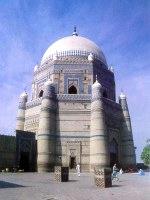Multan
|
|
Multan is a city in Pakistan and capital of Multan district in the Punjab Province. It is located in the southern part of the province, and is a very historic city. It has a population of over 1.3 million, making it the sixth largest city in Pakistan.
| Contents |
History
Multan is an extremely old city, which has seen a lot of warfare, because of its location on a major invasion route of India from Central Asia.
The history of Multan dates back to the time of Alexander the Great. It is believed to be the same city as Maii-us-than where Alexander's forces stormed the citadel after seeing their king injured and unconscious on the field of battle. In the mid 5th century, the city was attacked by a group of nomads led by Torman. These nomads were successful in taking the city, but did not stay, and the long-standing Hindu rule over the city was reestablished.
In the 7th century, Multan had its first experience with Muslim armies. Armies led by Mohalib launched numerous raids from Persia into India. However, they did not come to conquer, and seemed only to be exploring the area. However, only a few decades later, Muhammad bin Qasim would come on behalf of the Arabs, and take Multan along with Sind. The city at that time was known as the "city of gold" and numerous historians have written about an extremely large Hindu temple that housed over 6,000 people within it, known as the Sun Mandir. Following bin Qasim's conquest, the city was securely under Muslim rule, although it was in effect an independent state.
With the turn of the millennium, the city was attacked twice by Mahmud of Ghazni who destroyed the Sun Mandir, but he did not stay. After Muhammad Ghori's victories in India, and his establishment of a capital in Delhi, Multan was made a part of his empire. However, the rise of the Mongols would again give it some independence, albeit requiring it to be vigilant against Mongol raids from Central Asia.
Under the Mughal Empire, Multan enjoyed over 200 years of peace, and became known as Dar-ul-Aman (Abode of Peace). A lot of buildings were constructed in this time, and agricultural production grew rapidly. The decline of the Mughal Empire was not as devastating for Multan as it was for other cities. The city escaped the destruction brought upon India by the armies of Nadir Shah, but it was ruled from Kabul by numerous Afghan dynasties for a while.
In the 19th century, the Sikh ruler Ranjit Singh conquered Multan. Sikh rule would not last long, as the British were eventually provoked into checking the Sikh strength in Punjab. After a long and bloody battle, Multan was made part of the British Raj. This also signalled a decline in the city. The British built some railways to the city, but its industrial capacity was never developed.
Upon Pakistan's independence in 1947, Multan was in a very bad state.It was lacking industry, hospitals, and even places of higher education. Since then, there has been some industrial growth, and the city's population is continually growing. But the old city continues to be in a dilapidated state, and many monuments wear the effects of the warfare that has visited the city.
Location
The city of Multan is located in southern Punjab province. The area around the city is a flat plain and is ideal for agriculture. There are many canals that cut across the Multan district that provide water from nearby rivers. It is extremely hot in the summer.
multan is the hottest city in the world after siibi and nawab shah areas
language & literature
Being in Punjab, the majority of Multan's residents are Siraiki, and an overwhelming majority of the people are Muslim, although there are both Sunni and Shia Muslims present. Most of the people speak Siraiki language with a good portion of the people knowing Urdu. English is understood by the educated. Multan is also rich in literature,there are many poets who are known country wide.In urdu poetry Aasi karnali, Aslam ansari,Arsh sidiqui,Iqbal arshad,Arshad multani,Hazeen sidiqui,Anwar jamal,Razi-ud-din Razi,Ghazala Khakwani are popular poets of this city.
External links
- Images of Multan (http://www.worldisround.com/articles/86927/index.html)
- Multan from Pakvisit (http://www.pakvisit.com/pakistan/multanintro.html)
- Multan Profile (http://www.alephinc.net/multan/html/profile.htm)
- from Tourism Punjab (http://www.tourism-punjab.com/places.html#multan)
- itsPakistan, About Pakistan, Multan (http://www.itspakistan.net/pakistan/multan.aspx)
- [1] (http://groups.msn.com/multanpoets)de:Multan

